- From Faith Current: “The Sacred Ordinary: St. Peter’s Church Hall” - May 1, 2023
- A brief (?) hiatus - April 22, 2023
- Something Happened - March 6, 2023
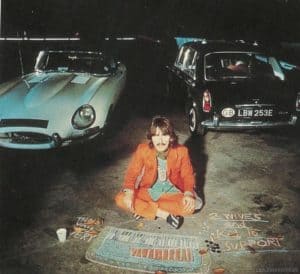
“The E-Type on his left symbolizes individuality, whereas the Mini on his right means…”
Longtime commenter Waterfalls wrote in recently with the following:
“I wanted to ask the Hey Dullblog community their thoughts on the song ‘Maxwell Silver Hammer’, after reading some comments on Youtube where some thought the song was actually about a real murder (i.e., Joe Orton and Kenneth Halliwell) and others believe it’s a clue in the Paul Is Dead movement, still others believe that it’s only a goofy singalong for a laugh, nothing more. I like the song and I was in the last camp believing that the song was just a singalong for a laugh until I got to thinking that the song is actually about The Beatles, and that it’s riddled with clues throughout. Here is my theory:
The Beatles used to be The Silver Beatles. The purpose of a hammer is to beat. The song is Heavy, Dark, and Light, all at the same time, which is a form of…Magic and genius.
Since Paul wrote the song, he is Maxwell Edison (ME). He gets away with “murder” by making the others rehearse MSH “to death” (“Again fellas, from the top!”) and it’s “killing them” to do it.
Joan/John is the intellectual equal, rival in science studies, kind of like real life John and Paul were competitive songwriting rivals.
Teacher/George is the no-nonsense grump who doles out character building punishment, a’la Bart Simpson repetitive chalkboard writings drills(chants).
Judge/Ringo is wise and fair but doesn’t see what’s coming at him.
P.C.31 are police security. Screaming Rose & Valerie are fans.
Showbiz jargon “kill the people” and “killed” are metaphors meaning “win over big” and “great success”, which could explain MSH’s “killing spree”, and describes The Beatles overwhelming success worldwide. “Bang Bang” is the easy availability and frequency of sex. The absurdity of the song is the craziness that was Beatlemania.
Maxwell…Mac’s well (Macca’s well) and not insane or vapid for writing the macabre song. One more thing, as much as John, George, and Ringo complained they hated the song, not one of them vetoed it making it onto the album. Anyway, I love the song. Does anyone agree with my theory or do you have a better one other than, just a great singalong for a laugh?”
I responded to Waterfalls that I thought he/she was building castles in the air, and he/she was crestfallen — but asked me to post nevertheless. Which I am doing, in part for everyone’s entertainment (it is a fun theory), and in part to address an issue that seems to be popping up a lot on HD over the last several years.
In general, there’s an increasing tendency on the site towards, well, speculation. I’ve indulged in some myself, with the unstoppable “Were John and Paul Lovers?” post which, years later, still smolders like a vein of ignited coal. And it’s fun and harmless and — let’s be honest — quite understandable given that the Beatles story is mostly over. There are no new songs to discover, no new movies or documentaries to share, two of them are dead and the living two aren’t the cultural force they once were. So we pick over what we do know, placing each fact under ever stronger magnification, connecting those facts in ever more complicated ways. And this is also why HD has mostly coasted to a stop. (That, and the fact that Bystander is eating my life.)
I suppose it’s inevitable that a site devoted to archeology in Pepperland would, as new data dried up, become speculative. But in this parlor game, every flight of fancy must be weighed — not only for its truthfulness, but whether it is, well, worth the journey. Waterfall’s theory about “Maxwell’s Silver Hammer” didn’t grab me not just because I don’t think John, Paul, George and Ringo worked like that — with certain exceptions, most Beatles songs aren’t messages in a bottle, waiting for fans to decode them — but also because it’s unnecessary. It’s ret-conning the music, trying to confirm a pretty standard set of beliefs about the inner workings of the group. Harmless fannish fun — but such stuff is a fan’s pastime in 2017, not Paul McCartney’s in 1969. And the theorizing can get between us and what’s really amazing here, much more amazing than if “Maxwell’s Silver Hammer” was Paul’s microcosmic “American Pie.”
The actual facts of the Beatles story — and the music they created — are inarguably miraculous. The speculating fans are right: there is a conspiracy here, a truly outlandish and beautiful one between artistic talent, economic conditions, history and fate. I’ve never heard a theory more unlikely and wonderful than what actually happened. If it pleases you to believe that Paul died in a car crash in 1966 and was replaced by William Campbell (or whatever the latest mutation is), far be it from me to spoil your fun — with no new grist for the Beatle-mill, fun must be grabbed wherever Beatlefans can grab it.
But as I get older, I think it’s far more amazing if Paul didn’t die. Think of it: a 24-year-old from Liverpool with minimal formal education in music produced more hits, and grew more rapidly, than perhaps anybody else in the history of pop culture. If Paul is dead, then Sgt. Pepper and everything after is reduced to a macabre and cynical put on, like some sort of beat group faking the Moon Landing. If he’s alive, it becomes an incomparable artistic achievement.
The Beatles, their story and their music, have become a secular holy book. As with the other holy books, each devotee comes to a fork in the road. On the one side, there is accepting the book at some sort of face value, and attempting to penetrate its wisdom more deeply, in order to plumb one’s attraction to it, and live its messages sincerely. On the other, there is cutting the text to pieces and rearranging it in one’s own image, to find out “what it’s really saying.” The latter is (usually) harmless; the former is, in the end, worth much more.

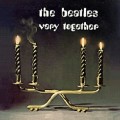
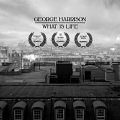
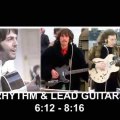

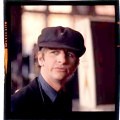
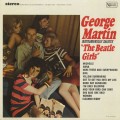
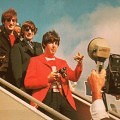
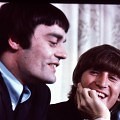
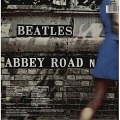
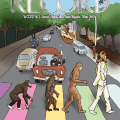
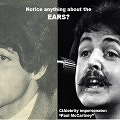
https://www.youtube.com/watch?v=Nk4nZe6bjRg
Think of it: a 24-year-old from Liverpool with minimal formal education in music produced more hits, and grew more rapidly, than perhaps anybody else in the history of pop culture.
.
I’ve wondered before and I’ll wonder again: Was Paul’s lack of formal education the thing that saved him? If he (and John and George) had been given years of training in musical history, composition and theory… would they have become the fabled centipede with the dilemma?
.
A centipede was happy – quite!
Until a toad in fun
Said, “Pray, which leg moves after which?”
This raised her doubts to such a pitch,
She fell exhausted in the ditch
Not knowing how to run.
.
Of course their gifts weren’t completely instinctive. They had skills and taste. They were quick enough in their songwriting to discard what didn’t work and improve what they kept. They knew their strengths and (for the most part) avoided ruts. But I believe their creative enthusiasm was fueled by their lack of formal education.
.
I’ve mentioned before how excited they were when they presented their ending harmony for “She Loves You” to George Martin. They were thrilled they had broken new ground. Martin cleared his throat and reminded them Glenn Miller had done the same harmony a few decades earlier.
.
Maybe Martin’s extensive knowledge made him too self conscious to craft uninhibited melodies. It’s hard to grow when you’ve convinced yourself “it’s all been done before.” He was a great producer, a great arranger, but lacked the access to the creative lifeforce that Paul and John tapped into.
.
I never go too deeply into analyzing Beatle lyrics. I’ve always suspected they indulged in free association when they built their songs. Of course who they were and how they felt about each other determined the content of the free association. But I compare it to a comic ad libbing onstage. Afterwards you can play the tape back and detect all sorts of themes and logic, but in the spark of the moment it’s pure flow.
I agree Michael. The Beatles didn’t work like that. And the factual, verified story is much more interesting. Maybe I sound grouchy but I’m really sick of people making up elaborate conspiracy theories and alternative “facts” using song lyrics as “clues”. Jeeez.
Hi! I’ve just recently discovered this blog and I’m sad I missed out on most of the fantastic discussions! Please don’t abandon this blog Michael!!
As to Waterfalls theory, I agree with you. I think it’s a song. Period. I myself am guilty of poring over books, blogs, trying to find some hidden clues as to the inner workings of the band. But as I’ve grown older, I realize it is what it is. I don’t think we’re going to find out anymore than we already know, unless Paul and Ringo want to disclose something new, and I don’t think they will. Whatever secrets they have will go to their graves.
Maybe Lewisohn will disclose some tidbits in his next books, but I don’t think it will be earth shattering!
Waterfalls, if you’re like me, you wish there could have been a nice, clean, happy ending to The Beatles story. John and Paul were reunited, BFF’s again, they wrote more wonderful songs, and the boys all played together again. But their ending was a heart breaker, and when John was killed, a tragedy.
As I sit here listening to The Beatles on SiriusXM, I realize their music makes me so happy!! In the end, that’s what matters the most.
Michael, you could start a thread about how we are all enjoying the Beatles Channel. Pros,
Cons. I myself love it!
Hi! I’ve just recently discovered this blog and I’m sad I missed out on most of the fantastic discussions! Please don’t abandon this blog Michael!!
Thank you @Tasmin, that’s very kind. Remember that there are hundreds of great posts here, most of which spurred long discussion. Even if the site remains ghostly, you have plenty to read. 🙂
Oh and PS — I don’t have Sirius, but I LOVE Chris Carter’s show on KLOS every Sunday, so I’m sure his show is great. What do you like most about it?
I love The Beatles Channel for many reasons. Obviously the first one would be, 24 hours of Beatle music!
The format is great! They play covers of the songs; I recently heard a great cover of Helter Skelter by Pat Benatar. They play the music the Beatles listened to pre-fame, like Carl Perkins, Everley Brothers, Ray Charles, etc..,
One of my favorite things is the demos. The other day, I heard a fantastic acoustic version of Watching the Wheels. It’s just John on guitar and it’s sooo good! So much better than the released version. More soulful.
Chris Carters show is awesome, and there’s other great commentary. There’s an ongoing show right now, where Billy Joel goes through each Beatles album, track by track. The last show he went through A Hard Days Night, and Beatles 65.
I sound like I work for Sirius, but I don’t I promise!! It is just, IMO, a must have for Beatles fans. It is worth every
penny!!
One last thing, there’s a show called My Fab Four, in which you can submit your favorite 4 songs, and if chosen, they play them with commentary by you! It’s interesting to hear what songs fans choose and why.
There’s no way I could choose just 4!!
Which 4 would you choose?
This whole post and most of the commentary are all varieties of over-reading. Some comments.
Maxwell’s Silver Hammer is not an allegory, which is what the dude is trying to say. Tolkien once told a fan that The Lord of the Rings was not an allegory, adding that he disliked allegory in all its forms. I don’t know if he said that “no true art could also be an allegory”, but I just said it, and I believe it. All art is modern; that is, it exists on its own terms. It is borne out of experience (born out of the “leaf-mould of the mind”, as Tolkien also said), but if it’s art it’s not a direct transmission of that experience (So much contemporary art is really not art, but a form of unwritten literary or social commentary.) Maxwell’s Silver Hammer may be the greatest piece of bad taste ever perpetrated by McCartney (and that’s saying something), but the dude was too great an artist to descend into the realm of the hack, where allegory resides.
I’m willing to bet that this imagining that there must be a one-to-one correlation between every word and some real world object or event is a pre-literate response to literature. People who imagine that poets write this way must never have attempted to write poetry. If you go on the Songfacts.com website, you can see kids committing these thought crimes every day. More than one person has remarked of “Tiny Dancer” that the line “piano man, he makes his stand, in the auditorium” must be about Billy Joel, because Billy Joel has a song called “Piano Man.”
These people are not poets. Or musicians. Or, to use the clinical definition, “thoughtful.” Beethoven once replied to a critic that the Sixth Symphony was not representative of a babbling brook, or a country dance, or a thunderstorm — but his reaction to those things.This has been going on for centuries, at least since book 23 of the Iliad started getting around (Achilles’ prize to Agamemnon — a bowl? After a spear and a sword? Achilles is calling Agamemnon a pussy, no? No? Anybody? Bueller?) Lennon used to tell interviewers that there was no hidden meaning to any of his songs, that he was just playing with words, in the same way that he had no idea he was using Aeolian cadences.
About Martin’s dislike of the ending of She Loves You. The Beatles ended the song on a 6 chord. Martin pointed out that this was by now a hokey device in popular music. It’s one hell of a looonnng stretch to conclude from this that Martin “lacked access to the creative lifeforce.” LOL. Over-reading. Lennon made a lot more sense when he replied that such a device was new to them, and therefore it would sound new to the kids listening to them. That’s all. It’s as simple as that.
There is no clue. There is no mystery. Talent wise, we’re all occupying a spot on a bell curve. Eventually, the really unlikely event of several guys way, way, way over on the right will get together, at the right time, in the right place, with the field prepared for them, and fortune will shine on them. We were all simply lucky enough to be there (more or less) when it happened. In the same way that we were all stupendously fortunate enough to be born in the first place.
Read Umberto Eco’s Foucault’s Pendulum for the most brilliant dissection of this peculiar human condition. You can turn a laundry list into a plot to take over the world, if you let yourself. People put bombs on trains because they’re looking for God. Go outside and get some fresh air.
As usual I love your literacy and passion, @Sir, but I think you get a bit too proscriptive.
“Thoughtful” is a bit baggy; people can be quite thoughtful (i.e., they show much “careful consideration or attention”) when they are spinning fantasies such as these. I would’ve perhaps used the phrase “used to thinking symbolically rather than literally.” That is a thing — it is a gulf between those who create such work, and those who enjoy it and sometimes interpret it.
But I’d be careful not to go too far in the other direction here, precisely because “Lennon used to tell interviewers that there was no hidden meaning to any of his songs, that he was just playing with words, in the same way that he had no idea he was using Aeolian cadences.” Anybody with even a casual knowledge of the Beatles knows that certain songs are simply filled with (completely acknowledged) subtext. “Sexy Sadie” is about Maharishi; “Norwegian Wood” is about an affair; “You’ve Got to Hide Your Love Away” was inspired by Brian Epstein; “Not Guilty” is about group dynamics. “Isn’t It a Pity”; “Early 1970”; “How Do You Sleep?” “Steel and Glass”… we all know them.
With so many examples of J/P/G/R using coded language in their songs — and sometimes speaking directly to each other, especially Lennon in moments of adoration or dudgeon — fans can be forgiven for seeing messages where there aren’t any. There is a point of irresponsibility, but @Waterfalls’ theory doesn’t come close — either in his/her reading, or his/her intent.
“Lennon used to tell interviewers there was no hidden meaning to any of his songs…”
Yes, and to underscore that point he would write songs with gobbledegook lyrics. He also would scold fans when they found “hidden meanings” in Beatles songs, but then HE found and heard all kinds of “hidden meanings” about himself and Yoko in songs on Paul’s Ram album and retaliated with ‘How Do You Sleep’.
He also claimed that when they sung “Get back to where you once belonged” that Paul would look at Yoko. And that ‘Hey Jude’ was more about himself than about Julian, who inspired the song according to Paul. I guess that I can be forgiven for connecting MSH characters to The Beatles and their experiences during Beatlemania.
@Michael, yes I have seen that video many years after my theory about BOTR, and was delighted when it confirmed my initial thoughts on the song. That may have been what encouraged me to believe that I could detect “clues” in Beatle songs. Hubris on my part I admit. (smile)
Chris Dingman, Thank you for your encouraging words, and I agree with you that, “The best art, I think, comes through an artist-not from their calculating mind. And often this “best art” comes when the artist is in a playful state, believing they are doing nothing more having a laugh-or following some chain of associations”. I’m an artist too. My best creations has been when I’m “in the zone” and just follow where inspiration leads. So I get what you are saying.
Sir Huddleston Fuddleston…Ok…I get it. My theory about ‘MSH’ to you was, just plain wrong. You needn’t have wasted your considerable education to mock my theory. As a high school graduate with only my life lived experience as my “higher education level”, I almost missed the point you were making through all that over the top pomposity about how wrong I’m supposed to be about ‘MSH’. Point received.
@Water, that’s a lot of what makes me so tolerant of fan theories: Lennon himself did it. And then acted on the meanings that he heard!
It’s fun. It’s what fans do. Let a thousand flowers bloom.
It took today before any comments on my theory about ‘Maxwell Silver Hammer’ appeared on my computer screen. Michael, you tried to warn me, but I thought perhaps there was a connection there between the characters in the song and Paul, John, George and Ringo, and I wanted to see what the community thought about it. After reading these few comments, especially linda a.’s, (“Ouch!”) I guess it’s a good thing I didn’t try to theorize that ‘Band On The Run’ is about The Beatles’ too, metaphorically speaking. Still, the characters in ‘MSH’ remind me of the Fab Four, and I guess I’ll just have to be in the wilderness on this one. I like the song and in the end, it’s about the music we all love, and that’s what really matters.
Well, @Waterfalls, such theorizing is what fans do. And I think you’re onto something about “BotR” (in my line of work, that usually stands for “Bored of the Rings”); have you ever seen the video?
https://www.youtube.com/watch?v=KBX2dySWGew
Tasmin Gardner, welcome to the community. I came late to the party too about 3…3 & 1/2 years ago, I think.
I’m still catching up reading some of the great discussions here. Intelligent comments, remarkable insight, civility even when discussions get heated. I was bowled over when I came across this place. This is one of the best blogs for Beatles discussion. Another one is The Historian and The Beatles. Thanks for your comment to me.
Water Falls,
Thank you for the welcome!
I love this blog, and wish I would have found it sooner!!
So many great articles, and intelligent, thoughtful discussions.
I love your ideas, Water Falls. Very intriguing. The best art, I think, comes through an artist–not from their calculating mind. And often this “best art” comes when the artist is in a playful state, believing they are doing nothing more than having a laugh–or following some chain of associations.
I don’t believe Paul intended any (or most) of how you read his song, but I think it’s entirely possible that the greater, artistic “mind” that he channeled WAS making those connections. I write poetry and the best things always come when I’m not planning them.
That BOTR video is crazy! Thanks for posting that Michael. I have never seen that before. I guess we know what “band” Paul is referring to!
My “first glance” impression of Maxwell’s Silver Hammer (which hasn’t changed much after all this analysis) is that it’s a quirky expression of violence and aggression. Every other Paul song on Abbey Road is filled with excruciating heartbreak. This ONE expresses deep anger with a happy-go-lucky melody. And it’s not just anger, it’s hatred. Murder. Disguised as a plucked-from-the-sky, fictional ballad. To me, that’s very McCartney – he says what he wants to say but obfuscates.
It’s like the bouncier the melody got the further he felt like he could go. Why not go all the way and just bludgeon some people to death with a hammer?
See, I find it SO STRANGE when people are like, “Oh, that Maxwell! That’s some of Paul’s meaningless Granny Music!” …..What?! Is the melody SO DISTRACTING that no one notices the plot about the serial killer and Paul’s gleeful recurring “BANG BANG!” on every chorus where he gets to vicariously murder everyone around him? Or maybe the melody just rubs people the wrong way (which I think it’s supposed to!) and they immediately tune out? I don’t know, but it’s bizarre the way everyone sleeps on this song.
Yeah, I’ve always wondered why everyone seems to hate the song as much as When I’m 64, Fool on the Hill, Your Mother Should Know and Honey Pie put together. (I’d say Ob-La-Di is equally reviled, but then it’s more famous.) Melody’s fun, lyrics are fun, arrangement’s clever, what’s the problem? Ian MacDonald called the song something like ‘an appalling lapse of taste’ but it doesn’t seem any more shocking than similar stuff by John Entwistle, Frank Zappa or even the Stones (‘Live With Me’, ‘Brown Sugar’). Not to mention every gangsta rap ever. Always felt like I was missing something here.
I’ve come to the recent conclusion that Maxwell’s Silver Hammer is a song parody – it’s Paul writing a parody of all his previous “granny” songs.
.
Robert Benchley once wrote a brutal parody of himself and called the essay “The Menace of Buttered Toast.” He mocked every aspect of his own style: the trivial subject matter, the befuddled affect, the professorial pomposity…
.
I think “Silver Hammer” is Paul poking fun at all the corny musical hall songs he’d contributed over their recorded output. It’s a manic-cheerful sendup with the most subversive lyrics he could think of. A granny song sing-along about brutal, serial murder. It’s a brilliant sendup and proof his sense of humor was just as complex as Lennon’s.